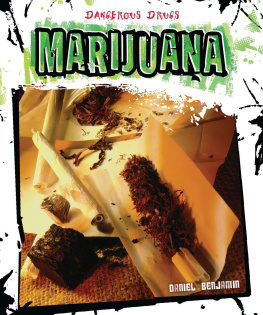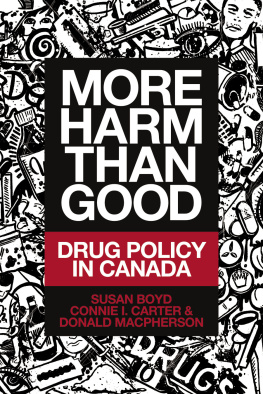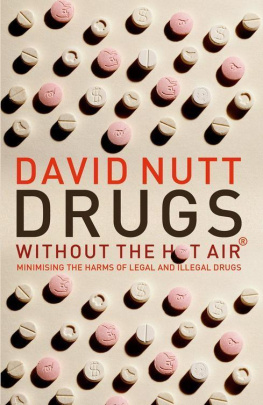DRUG EFFECTS
Advances in Critical Medical Anthropology
Series Editors: Merrill Singer and Pamela Erickson
This book series advances our understanding of the complex and rapidly changing landscape of health, disease, and treatment around the world with original and innovative books in the spirit of critical medical anthropology that exemplify and extend its theoretical and empirical dimensions. Books in the series address topics across the broad range of subjects addressed by medical anthropologists and other scholars and practitioners working at the intersections of social science and medicine.
Volume 1
Global Warming and the Political Ecology of Health: Emerging Crises and Systemic Solutions, Hans Baer and Merrill Singer
Volume 2
The Healthy Ancestor: Embodied Inequality and the Revitalization of Native Hawaiian Health, Juliet McMullin
Volume 3
Drug Effects: Khat in Biocultural and Socioeconomic Perspective, Lisa L. Gezon
DRUG EFFECTS
Khat in Biocultural and Socioeconomic Perspective
Lisa L. Gezon
First published 2012 by Left Coast Press, Inc.
Published 2016 by Routledge
2 Park Square, Milton Park, Abingdon, Oxon OX14 4RN
711 Third Avenue, New York, NY 10017, USA
Routledge is an imprint of the Taylor & Francis Group, an informa business
Copyright 2012 Taylor & Francis
All rights reserved. No part of this book may be reprinted or reproduced or utilised in any form or by any electronic, mechanical, or other means, now known or hereafter invented, including photocopying and recording, or in any information storage or retrieval system, without permission in writing from the publishers.
Notice:
Product or corporate names may be trademarks or registered trademarks, and are used only for identification and explanation without intent to infringe.
Library of Congress Cataloging-in-Publication Data:
Gezon, Lisa L.
Drug effects : khat in biocultural and socioeconomic perspective / Lisa L. Gezon.
p. cm. (Advances in critical medical anthropology; v. 3)
ISBN 978-1-59874-490-3 (hbk. : perm paper) ISBN 978-1-59874-491-0 (paperback : perm paper) ISBN 978-1-61132-788-5 (eBook)
1. KhatSocial aspects. 2. KhatEconomic aspects. 3. KhatPolitical aspects. I. Title.
HV5822.Q3G49 2011
583'.85dc23
2011030972
Cover design by Piper Wallis
ISBN 978-1-59874-490-3 hardcover
ISBN 978-1-59874-491-0 paperback
Dedication
To my children, Evan and Adam, who supported my long hours of work and whose presence with me in Madagascar opened so many doors to friendship and understanding.
CONTENTS
Khat Comes to Madagascar
Contexts of Consumption
Leaf of Paradise or Scourge?: Drug Effects and Health
Growing and Selling Khat
Indirect Effects of Khat: Conservation, Food Security, and Access to Health Care
Intimate Livelihoods: Gender and Survival on the Margins
The Loud Silence of Green Gold: War on Drugs, State Silence, and Alternative Development
Drug Effects: A Holistic Perspective
This project has been in progress since 2000more than ten years before writing these acknowledgments. It was then that I began to write grant proposals to study how urban consumption patterns affect patterns of exploitation of forest products within the region surrounding the city. Coming from a political ecology perspective, I wanted to build on my interest in the human dynamics of conservation and land use change. My earlier work (Gezon 2006) centered on the micropolitics of protected area management around the Ankarana Special Reserve, which lies to the south of the Amber Mountain National Park, the focus of this current research on khat. For this project, I wished to concentrate not only on the proximate drivers of deforestation but on the entire commodity chain, in order to consider how consumer demand shapes land use decisions. This focus would connect local land use practices directly with regional, national, and global influences.
Knowing that farmers around Amber Mountain have a long history of producing cash crops (fruits and vegetables in particular), and recognizing its proximity to the urban consumers and transportation networks of the city of Diego Suarez, this seemed like a logical place to do fieldwork. At the time I wrote my grant proposals, I was not yet aware of how important khat was to the economic and ecological transformation of the regionand how central it would become to my study. Early fieldwork revealed the importance of khat to farmers, traders, and consumers. Later fieldwork showed the complex relationship between vegetable and khat production that I describe in .
After several attempts and much refining of my ideas, my research on commodity chains and land use in northern Madagascar was funded in 2003 by the National Geographic Society (Grant Number 7413.03), the National Science Foundation (Award Number BCS-0318640), and a U.S. Department of Education Fulbright-Hays Faculty Research Abroad Fellowship. I went to Madagascar for one month in 2003, six months in 2004, and one month each in 2005, 2007, and 2010. The trip in 2010 was funded by the University of West Georgia College of Arts and Sciences Faculty Research Grant Program and by a collaborative grant from the Canadian Social Sciences and Humanities Research Council International Opportunities Fund Grant (PIs Andrew Walsh and Ian Calquhoun). I am thankful to all the reviewers and program officers for their confidence in my project in its various phases.
My interest in the medical aspects of khat emerged as I realized that khats drug qualities shaped peoples experience with it as a commodity: Fears about the dangers khat poses to health, combined with experiences of pleasure, sociability, and peoples high willingness to pay for it renders khat heavy with implications. From a political ecology perspective, its status as a drug influenced peoples decisions to transform rice fields and even forests into khat fields. It seemed like a critical medical anthropology (CMA) perspective would be the best one for getting at khats multiple aspects. Inquiring holistically into khats effects as a drug would include, but go beyond, a political ecology analysis. As I became more immersed in the CMA approach, my analysis became increasingly framed around forming an understanding of khats multifaceted drug effects. The result is this book, which addresses a question that weighs heavily on the minds of many in northern Madagascar: Is khat good or bad? Although the question is simple, the answer is, not surprisingly, complicated. My hope is that this exploration of drug effects will inspire studies of other drugs as situated in biocultural and socioeconomic contexts.
I am thankful to many people who, over the many years since I began this project, have contributed in one way or another to it. My apologies to those I may leave out. All shortcomings are fully my own responsibility. For the writing up of this work, my first thanks go to my editors, Jennifer Collier, Pam Erickson, and Merrill Singer, who believed in this project and gave me the encouragement I needed to finish this manuscript. Their insightful comments helped me find my voice. I also thank my colleagues at the University of West Georgia (UWG) for supporting me along the way. First of all, I thank my chair, Marjorie Snipes, whose bright smile and caring words have gotten me through both challenging and good times. I thank Karl Steinen for generating the map of northern Madagascar. Warm friendship and moral support have come from various other colleagues at UWG, including Aran MacKinnon, Jeannette Diaz-Laplante, Chris Aanstoos, Cita Cook, Jane McCandless, Thomas Foster, and many others too numerous to name. Supportive academic colleagues beyond UWG include Conrad Kottak, Bruce Mannheim, my entire cohort from the University of Michigan, Susan Paulson, Andrew Walsh (Jao Ankarana), Ben Freed, Janice Harper, Rebecca Green, Betina Torbjornsen, Ann Kingsolver, Laurent Berger, Sophie Blanchy, Louise Lamphere, Carol Stack, Jennifer Cole, Andrew Mathews, and the list could go on.











